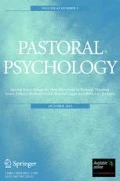Abstract
This article addresses the problems and prospects that follow from the conceptualization of religious phenomena and practices for scientific investigation in the psychology of religion. Two Western research traditions—instrumentalism and operationalism—are described and their potential contribution to a mismatch between what researchers intend to study and what they actually study is illustrated through two exemplar studies. The exemplar studies show how researchers’ concern with methodological rigor can compromise the rich and thick meanings of religious practices, resulting in the misrepresentation of the practices and misleading both the psychological and religious research consumer. Several suggestions for dealing with these problems are discussed.
Similar content being viewed by others
Notes
We would also contend that the relation itself, even if between two observables, is not observable (Slife et al. 2005).
God, according to these researchers, is a useful means for helping marital relationships produce individual happiness (p. 3).
From this empirical perspective, if the quality of prayer is an issue, it can be evaluated through the quantity of prayer. For example, the investigators surmise that the “regular practice” of prayer will “serve to keep positive relationship goals salient” leading to positive “cognitive schema” (p. 2), as if mere repetition is an indicator of prayer’s quality.
The researchers discuss “the prayer’s effect on relationship” in the experimental portion of their publication (Fincham et al., 2010, p. 9), as if prayer is a natural cause and relationship outcome is its necessary effect. This is, after all, the logic of experimental design. However, a truly theistic prayer does not presume the causal efficacy of the prayer itself. As virtually all theists know, their prayer is provided to a God who may or may not grant the prayer request, or may grant it in a way the person providing the prayer (or the researchers) may not know. For example, from the perspective of the study participants, they were praying for the well-being of their partners, not some beneficial effect for themselves. In this sense, the partner could have been blessed in some important manner without it affecting or being perceived by the participant of the study at all. In other words, the prayer could have been answered in many ways that were never considered or measured. The instrumentalism of the investigators blinded them to these types of outcomes, because the only outcomes that counted for them were the ones that directly benefitted the person who prayed.
“In general terms,” declares the Concise Oxford Encyclopedia of World Religions, “it is meditation rather than prayer that is recommended as the main spiritual practice of Buddhism” (Bowker, 1997).
Even during the measurement itself, the religious traditions were rarely respected. Consider this quote: “During the second heartbeat detection block (HB2), participants were instructed to practice a yogic breathing pattern” Khalsa et al., 2008, (p. 673). If this breathing pattern (the only meditative instruction given) is truly Hindu in origin, how would the Buddhist participants relate to it? Even if they performed it satisfactorily, as a manipulation check, they might not be able to relate to it in terms of its meaning within their religious tradition. It’s just a breathing pattern to the investigators; religious meanings are almost irrelevant.
References
Bishop, R. C. (2007). The philosophy of the social sciences. New York: International Continuum Publishing.
Bowker, J. (1997). Concise Oxford dictionary of world religions. Retrieved March 4, 2011, from http://www.encyclopedia.com/topic/Prayer.aspx#2.
Browning, W. (1997). A dictionary of the Bible. Retrieved March 4, 2011, from http://www.encyclopedia.com/doc/1O94-prayer.html.
Fincham, F., Lambert, N., & Beach, S. (2010). Faith and unfaithfulness: Can praying for your partner reduce infidelity? Journal of Personality and Social Psychology. doi:10.1037/a0019628. August 16.
Fowers, B. (2000). Beyond the myth of marital happiness. San Francisco: Jossey-Bass.
Khalsa, S., Rudrauf, D., Damasio, A., Davidson, R., Lutz, A., & Tranel, D. (2008). Interoceptive awareness in experienced meditators. Psychophysiology, 45, 671–677.
Livingstone, E. (2000). Concise Oxford dictionary of the Christian church. Retrieved March 4, 2011, from http://www.encyclopedia.com/topic/Prayer.aspx#3.
Luk, C (1964). The secrets of Chinese meditation. York Beach, ME: Samuel Weiser, Inc. Retrieved March 4, 2011, from http://en.wikipedia.org/wiki/Buddhist_meditation.
Nelson, J. (2009). Psychology, religion, and spirituality. New York: Springer.
Slife, B. D., & Melling, B. S. (in press). Method decisions: Qualitative and quantitative modes of inquiry in the study of religious phenomena. Pastoral Psychology.
Slife, B. D., Wiggins, B. J., & Graham, J. T. (2005). Avoiding an EST monopoly: Toward a pluralism of methods and philosophies. Journal of Contemporary Psychotherapy, 35, 83–97.
Story, F. (2010). Buddhist meditation. Retrieved March 4, 2011, from http://www.accesstoinsight.org/lib/authors/story/bl015.html.
Yuan, M. (1986). Mountain: A seven day intensive in Ch'an training with Master Nan Huai-Chin. Retrieved March 4, 2011, from http://en.wikipedia.org/wiki/Buddhist_meditation.
Author information
Authors and Affiliations
Corresponding author
Rights and permissions
About this article
Cite this article
Slife, B.D., Reber, J.S. Conceptualizing Religious Practices in Psychological Research: Problems and Prospects. Pastoral Psychol 61, 735–746 (2012). https://doi.org/10.1007/s11089-011-0397-9
Published:
Issue Date:
DOI: https://doi.org/10.1007/s11089-011-0397-9




